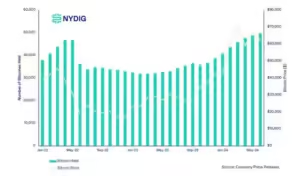Germany’s $2.2 Billion Bitcoin Stash: Market Impact and Strategic Implications

Quicktake:
- Germany still holds 29,286 BTC worth $2.2 billion
- Recent sales have added to market turbulence
- Germany’s holdings represent 9% of Bitcoin’s 24-hour trading volume
- Seizure of 49,857 BTC from Movie2k.to operators earlier this year
- Bitcoin prices have dropped nearly 20% in four weeks
Germany continues to hold a substantial amount of Bitcoin, with 29,286 BTC valued at approximately $2.2 billion, according to Arkham Intelligence. This significant holding represents nearly 9% of Bitcoin’s 24-hour trading volume, introducing potential selling pressure that could further destabilize the market. Since mid-June, Germany has been gradually liquidating its Bitcoin holdings, contributing to recent price volatility and market unease.
Historical Context and Seizure
Earlier this year, the German Federal Criminal Police Office (BKA) seized 49,857 BTC from the operators of Movie2k.to, a website that had ceased operations in 2013. This large-scale seizure added a substantial amount of Bitcoin to the German government’s holdings. However, since mid-June, over 10,000 BTC have been liquidated, creating downward pressure on Bitcoin’s market price. As a result, Bitcoin’s spot price has dropped nearly 20% over the past four weeks, with a 13% decline in the last seven days alone, according to CoinDesk data. The CoinDesk 20 Index (CD20), which provides a broader market gauge, has also declined by nearly 14%, falling to 1,870 points within a week.
Market Reaction and Broader Implications
The continued liquidation of Germany’s Bitcoin stash has raised concerns within the crypto community. Last week, Tron founder Justin Sun offered to purchase Bitcoin from the German government off-market to mitigate the negative impact on the spot price. Such offers underscore the anxiety among market participants about the potential consequences of large-scale government sales on Bitcoin’s value.
Observers and analysts have criticized Germany’s strategy, viewing the sale of Bitcoin for fiat currency as a significant strategic error. The Blockware Intelligence newsletter, in its July 5 edition, described the German government’s actions as a “strategic blunder” from a geopolitical perspective. The newsletter argues that selling Bitcoin for fiat currency, which can be printed indefinitely, is shortsighted, given Bitcoin’s finite supply of 21 million and the substantial physical energy required to mine it. The perception is that Germany is forfeiting a valuable asset with long-term potential for short-term fiat gains, which could be seen as detrimental in a global context where digital assets are increasingly becoming a significant part of national reserves and economic strategy.
Strategic Perspectives and Future Outlook
From a strategic viewpoint, retaining Bitcoin could be advantageous for nation-states. Bitcoin’s limited supply and the growing difficulty in mining new coins position it as a potential store of value, akin to digital gold. In contrast, fiat currencies are subject to inflationary pressures and can be produced at will by central banks. Therefore, holding onto Bitcoin could provide a hedge against inflation and economic instability.
Germany’s approach contrasts with that of other countries that have embraced digital assets more fully. For instance, countries like El Salvador have adopted Bitcoin as legal tender, viewing it as a way to enhance financial inclusion and economic independence. While Germany’s actions might be driven by immediate fiscal considerations, they could be missing out on the broader strategic benefits of holding Bitcoin.
Community Reactions and Market Sentiment
The crypto community has been vocal about Germany’s Bitcoin sales. Many believe that off-market transactions, such as the one proposed by Justin Sun, could mitigate the negative impact on Bitcoin’s price and provide a more stable market environment. Such private deals would prevent large sell-offs that can trigger panic selling and further price declines.
However, the German government’s current strategy appears to be focused on liquidating assets seized from criminal activities, which complicates the situation. Balancing the need for fiscal responsibility with the potential long-term benefits of holding Bitcoin is a complex challenge that governments around the world are grappling with.
Conclusion
Germany’s continued holding and gradual liquidation of its substantial Bitcoin stash have significant implications for the cryptocurrency market and geopolitical strategy. The potential selling pressure from Germany’s Bitcoin reserves introduces volatility and uncertainty in the market, as seen in the recent price declines. While offers like Justin Sun’s off-market purchase aim to stabilize the market, the broader debate about the strategic value of Bitcoin versus fiat currency remains a critical issue.
For investors and market participants, staying informed about these developments is crucial. The actions of nation-states and their strategies regarding digital assets can have far-reaching effects on market dynamics and long-term valuations. As the cryptocurrency market evolves, the interplay between government policies, market reactions, and strategic considerations will continue to shape its future.



